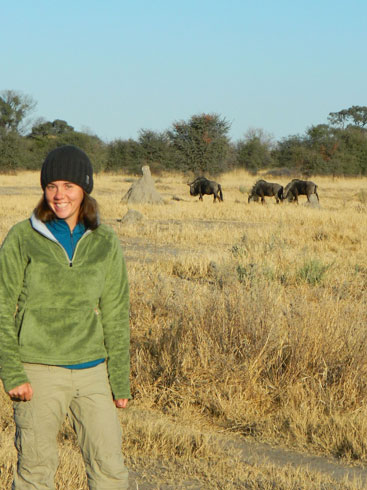Lindsey Rich receives Fulbright grant to study carnivores in Botswana

Lindsey Rich of Evergreen, Colorado, a fish and wildlife conservation doctoral student in Virginia Tech’s College of Natural Resources and Environment, has been awarded a Fulbright U.S. Student Program grant for her work in Botswana developing a long-term monitoring program for carnivores.
Rich is one of three Virginia Tech students to receive a 2014 Fulbright award. Erin Poor, a doctoral student studying fish and wildlife conservation and geospatial environmental analysis in the College of Natural Resources and Environment, and Kathryn Fiedler, a postdoctoral student who earned her doctorate in plant pathology, physiology, and weed science from the College of Agriculture and Life Sciences in May 2014, each received Fulbright U.S. Student Program grants.
Rich completed the pilot season of her carnivore monitoring program in 2013 as part of her doctoral research. The project will continue through 2015, now with the backing of the Fulbright Program and the full support of Botswana.
“Botswana makes the final decision on who receives the awards,” Rich said. “Receiving the award is exciting because it means the country is interested in what I’m doing and supports my research. Hopefully that will help the success of the project.”
Her work as a Fulbright scholar will continue the groundwork she laid last year. “It will be more extensive,” Rich explained. “In the pilot season I had two smaller study areas; in my upcoming field seasons I will have three larger study areas.”
Ultimately, Rich hopes her research will not only provide detailed information on native carnivore populations in Botswana, but also be developed into a sustainable monitoring program that can contribute to the understanding and management of many native wildlife species.
Since her work utilizes motion-sensing cameras placed throughout various habitats, she collects photographs of every animal that crosses in front of the cameras, not just carnivores. The additional data could become invaluable to future researchers and managers seeking information on population distributions of nearly every local species.
“There are an array of projects going on in different areas, but there’s no systematic monitoring of carnivore communities,” Rich said. “The camera traps are a way to get that information over large areas in a time- and cost-effective way.”
Her research will also be useful as Botswana continues to develop as a country; it can help determine where human expansion will have the lowest impact on wildlife populations.
“Lindsey’s research project will have a strong influence on the conservation of carnivores in Botswana, and will positively impact local people through engagement by linking science and education,” said Associate Professor Marcella Kelly, Rich’s advisor.
Wild Joys, the conservation outreach program Rich spearheaded last August, will continue alongside her Fulbright research. The program hosts day trips that take children from rural communities into the natural habitats to experience local wildlife firsthand.
“The children see wildlife in their natural environment and learn natural history, animal behavior, and field research methods,” Rich said. “We hope to inspire the youth to be concerned with conservation, thus increasing the chances of wildlife persisting in and outside of protected areas.”
She hopes her research and methods will contribute to wildlife management and land-use planning in other regions of Africa as well.
Rich received a bachelor of science in wildlife biology with a minor in zoology from Colorado State University and a master of science in wildlife biology from the University of Montana before pursuing her doctorate at Virginia Tech.
In addition to receiving a Fulbright grant, Rich was selected as an Evelyn K. Aitken Named P.E.O. Scholar for 2014-15 by the International Chapter of the P.E.O. Sisterhood. Of the 85 Scholars chosen, Rich was one of 12 to receive the distinction of being named an Endowed or Named Scholar.




